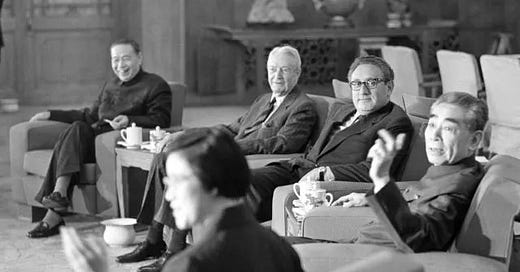In Rule of the Five Percent, I mentioned the esteem in which senior Chinese officials are held and tried to explain why. Here we focus on a single government department, the diplomatic corps, and why many of its officials are rock stars, with millions of followers.
The apology
Because his signature is mandatory on all treaties (and he was Nixon’s confidant), millionaire, diplomat, lawyer and Secretary of State William Rogers (second from L), accompanied him to Beijing. However Kissinger, a ruthless infighter, kept him in the dark about the agreement that he and Nixon were negotiating with the Chinese. Though it had been initialed by both sides, he found two serious flaws that gave China an asymmetrical advantage, but Kissinger and Nixon refused to ask the Chinese to alter an historic document they has signed amid mutual congratulations.
Rogers’ decades of treaty-drafting had been bypassed and ignored, the State Department had been humiliated, and historians would attribute the faulty agreement to his ‘weakness’. It was humiliating. He began packing to return to the US (so to scuttle the deal, which he had not signed) when came a knock on his door.
“I opened the door expecting the bellman and there stood a smiling Prime Minister Zhou En Lai, with two shot glasses in one hand and a bottle of rare Scotch in the other”. Pouring two shots, Zhou explained, “I’ve come to apologize. I became so excited at the prospect of reaching an agreement that I failed to consult you as protocol requires”. Zhou asked Rogers to reword the agreement to his liking and sent the changes to the Ministry. An hour later, he and Zhou signed it and honor was saved.
Greasing the skids
A retired SE Asian diplomat told me of a time when America was trying to justify its imminent invasion of Iraq and China was high on its hit list. “What distinguishes them from other diplomatic corps is their ability to cooperate and to galvanize support from unlikely quarters. Suddenly, all over the world, their diplomats were greasing the skids for America’s invasion, encouraging countries to grant transit rights and diplomatic support.
“You many not remember but, at that time, Iraq was the home of ETIM, the Xinjiang terrorists, so America would be fighting China’s worst enemy at no cost to China. They call it ‘allowing the barbarians to fight the barbarians,’ and they’ve been doing it for thousands of years”.
Saying goodbye to Uncle Wang
Admiration for their diplomats is as strong today as ever, as Manya Koetse (MPhil, Sinology) reports in her What’s on Weibo: Saying Goodbye to Uncle Wang. Wang Wenbin Becomes Chinese Ambassador to Cambodia..
When China’s Ministry of Foreign Affairs (MFA) Spokesperson Wang Wenbin concluded a regular press conference on May 24, he suddenly said “farewell” (“我们再见”) and stepped down to shake hands with reporters. This surprising moment quickly had his online fan circles buzzing. Was he leaving? Starting a new job? Everyone was speculating. Wang has been with the Foreign Ministry since 1993. His face became familiar to many both inside and outside China after he took on the role of MFA spokesperson in 2020. Over the years, Wang has become increasingly popular on social media. There are thriving fan forums filled with thousands of posts and videos dedicated to Wang, praising his professionalism and humorous expressions.
Nearly two weeks later, on June 4th, it was announced that Wang will be starting as China’s new ambassador to Cambodia. A related Weibo hashtag attracted 130 million views on one day. Why is Wang so popular?
First, his popularity is part of a larger trend of Chinese diplomats being admired and idolized online. But besides being part of China’s “Diplomat Dream Team” (外交天团), Wang is admired for his conduct and character. He appears very serious but often shows a smile. He is highly professional, yet occasionally displays a playful side.
These likeable traits in his persona reflect his background. While Wang represents international China, he comes from a small village. Born and raised in Xindu in Tongcheng, Anhui, Wang studied at China’s Foreign Affairs University, majoring in French and economics. He speaks several foreign languages, including English, and once sent out New Year’s wishes in 11 different languages. His success story makes him “Anhui’s pride.”
While Zhao Lijian was known as a ‘wolf warrior,’ Wang Wenbin is perceived as “calm,” “scholarly” and “refined,” though critical, firm and assertive. Wang rebuffed U.S. claims that China might arm Russian troops in the Ukraine war, “it is the United States and not China that is endlessly shipping weapons to the battlefield.” He also called the shootdown of the alleged Chinese spy balloon “100 percent hysteria” and urged the United States to abandon its “hegemonic” approach to international affairs.
Wang fans appreciate how he shapes China’s image abroad: “It’s the perfect interpretation of an elegant great great power.” Many see Wang as relatable, a likable role model, saying “Uncle Wang’ (汪叔) is just too cool.” By Manya Koetse.
Next week, a woman, a nobleman, a boar, whisky and shot glasses again, but elsewhere.




